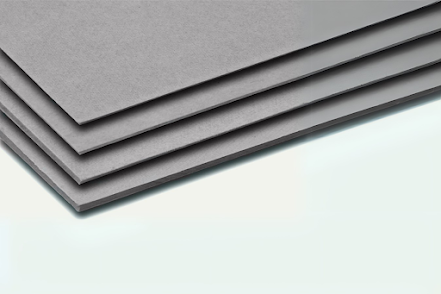Why Is Chip Board Grey Board Gaining Popularity in Eco-Friendly Packaging?
Introduction
Chip Board is
receiving serious consideration in today's packaging environment. As companies
and households continue to become more focused on sustainability and their
environmental footprint, changes in packaging direction is inevitable. And of
all the paths taken, Chip Board (commonly referred to Grey Board) is leading
the charge as an ecologically friendly packaging option.
But what are the effects of Chip Board? And why is Chip
Board a buzzword today? Let's dig deeper into this phenomenon and identify the
driver.
What is Chip Board?
Chip Board is a type of thick paperboard produced using
recycled paper pulp. Chip Board is clean, stiff, durable and versatile in its
usage. Chip Board is not made with fluted paper like Corrugated Cardboard, so
it is smooth on the surface. Because of this smoothness, Chip Board works well
wherever neat finishes are required (packaging boxes, book covers, backing
sheets, folders etc).
The Trend Toward Eco-Conscious Packaging is Growing
Consumers today are more conscious about their decision
making and how their choices impact the environment. From banning plastic bags,
to swapping out plastic toothbrushes for bamboo toothbrushes, eco-conscious
living is becoming more mainstream. This shift in consumer behavior is forcing
businesses to find functional and environmentally friendly packaging options.
This is where Chip Board comes into play. Chip Board offers
an excellent combination of strength, usability, and sustainability.
How Chip Board Supports Eco-Friendly Packaging Goals
♻️ Recycled Content
Chip Board is typically made from 100% recycled
fibers. That means no virgin trees are cut down in the making. Plus, the board
itself can be recycled again after use, completing a sustainable loop.
🌿 Biodegradable and Compostable
Being paper-based, Chip Board breaks down naturally
over time. In comparison to plastic or foam-based packaging materials, Chip
Board is far more environmentally safe.
📦 Versatile for Design
Because of its compact structure, Chip Board can be
easily cut, printed, or laminated without losing strength. This makes it a
flexible solution for eco-conscious brands wanting custom-designed packaging.
Industries That Benefit Most from Chip Board
1. Retail Packaging
From clothing to cosmetics, retailers are using Chip
Board to create minimal yet strong packaging that appeals to eco-conscious
customers.
2. Food Packaging
Although it’s not directly used for storing food, Chip
Board is perfect for outer packaging like pizza boxes, frozen food trays,
and cereal boxes.
3. Electronics
Delicate electronics require sturdy and compact packaging. Chip
Board provides the structure needed while also keeping the environmental
impact low.
Why Is Chip Board Better Than Plastic or Foam?
It’s just that easy — plastic and foam are not
biodegradable. They linger in the environment for hundreds of years and
endanger flora and fauna, and the food chain. Chip Board is renewable,
recyclable, and less destructive.
On top of that, with global packaging regulations being
enforced consistently companies are being pushed to find alternatives to
harmful materials. Chip Board offers a great dependably responsible
alternative.
Chip Board in Premium Packaging
A lot of luxury and boutique brands are now selecting Chip
Board for their rigid boxes and product sleeves. Chip Board has finishing
options such as laminating, foil stamping, embossing and UV coating, that make
it look just as premium as plastic - without the guilt.
Cost-Effectiveness and Availability
One of the more understated benefits of Chip Board is its
cost effectiveness. Because it is made from recycled paper, Chip Board is
cheaper than many other materials. Additionally, Chip Board is a manufacturers
dream as it comes in many GSM and thickness levels so there are no supply
issues.
Is Chip Board Durable Enough?
Many assume eco-friendly materials aren't strong. But Chip
Board is surprisingly tough. Whether you need it in single-ply or
multi-layered format, it delivers strength without adding bulk. That’s why it’s
also preferred in crafting and bookbinding industries.
The Future of Chip Board in Sustainable Packaging
The global transition towards carbon neutrality and
zero-waste operations is just beginning. As this transition takes place, Chip
Board should become a primary material within sustainable packaging
initiatives.
Brands that adopt now are not only helping to save the
planet, but they are also aligning with the values of their future consumers.
FAQs About Chip Board in Eco-Friendly Packaging
Q1. Is chip board the same as cardboard?
Not quite. While both are paper-based, Chip Board is
denser, smoother, and more uniform than standard cardboard, which is corrugated
and thicker.
Q2. Can chip board packaging be customized?
Absolutely. You can cut, print, emboss, or laminate Chip
Board to suit various design needs while maintaining its structural
integrity.
Q3. Is chip board safe for food contact?
Chip Board can be used for secondary food packaging.
For direct food contact, food-grade coatings may be required.
Q4. How sustainable is chip board compared to grey board?
Both materials are sustainable, but Chip Board is
more commonly recycled and used in wider packaging applications. Grey Board
often refers to thicker, unbleached recycled board, typically used for
heavy-duty uses like bookbinding.
Conclusion
Chip Board's growing acceptance for green packaging is no
fad. Rather, it is an indicator of the movement the packaging sector is
following. Chip Board is inexpensive, customisable, and 100% sustainable.
Although Grey
Board also plays a part in this transition, ultimately Chip Board's
flexibility and accessibility continues to gain traction with even more brands
each day.
If you are considering the options for making your packaging
more environmentally friendly, switching to Chip Board may be the best choice
you make this year!



Comments
Post a Comment